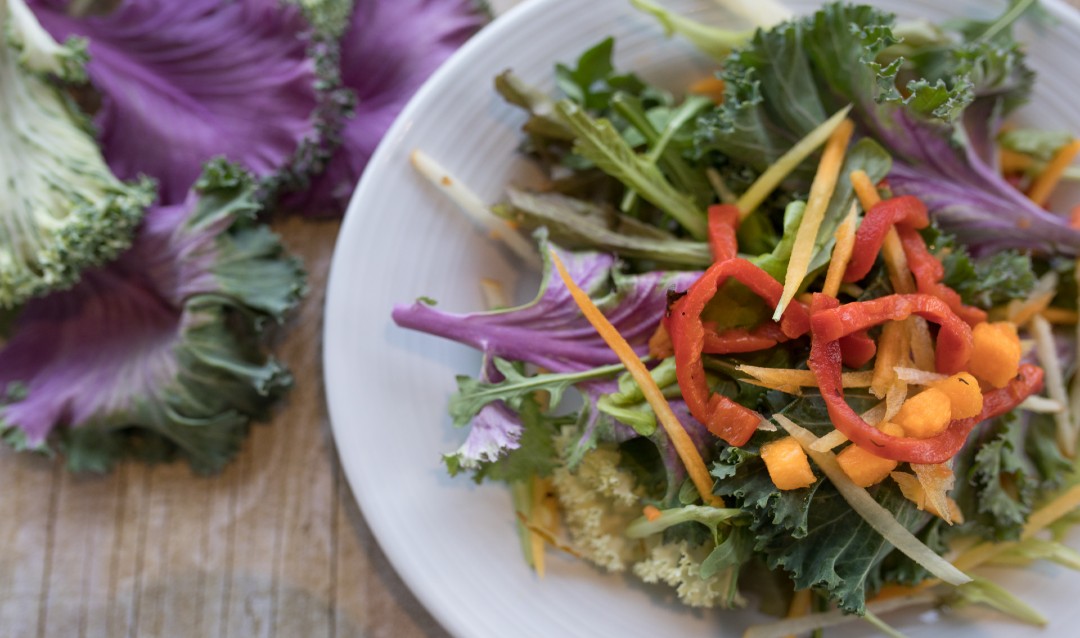In an ongoing effort to promote sustainability, Lehigh has achieved its Real Food Challenge goal by purchasing 20.3 percent of its food from local, organic, fair trade and humane sources in the 2019-2020 academic year.
The university’s efforts contribute to the overall vision of the Real Food Challenge, a national campaign to encourage campuses to increase the ratio of their food purchased from “conventional” to “real” food. The Real Food Challenge aimed to divert $1 billion (20 percent) of existing university food budgets away from industrial farms and unhealthy food and towards local and community-based, ecologically sound and humane food sources.
Lehigh’s Office of Sustainability, Dining Services and Purchasing Services, and Sodexo have collaborated on the challenge for the past seven years. When Lehigh’s interdepartmental collaboration began in 2013, Lehigh purchased 2 percent “real” food and reached 15 percent by 2019.
In 2017, President John D. Simon signed the “Real” Food Campus Commitment, which pledged that Lehigh would purchase at least 20 percent of its food annually from local/community-based, fair, ecologically sound, or humane sources by 2020. This made Lehigh the third university in Pennsylvania to formally undertake the Real Food Challenge.
"I commend the excellent work and dedication of our community to meet the goal we set in 2017 and look forward to seeing continued progress as a result of these important and ongoing efforts,” said Simon. “The university is committed to doing its part to promote environmental stewardship and a healthy food system, including through sourcing 'real food,' as demonstrated by its support of the Real Food Challenge and this recent achievement."
“Real” food is defined by four categories:
- Local: Food sourced from a 150-250 mile radius of campus.
- Fair: Food that can be certified as Fair Trade which confirms that employees of the company have living wages, right to benefits, equal pay, etc.
- Ecological: Food that is grown in a way that is safe for the consumer, producer and planet. This includes certifications such as USDA Organic, Rainforest Alliance, etc.
- Humane: Food sourced from animals that have been treated in a humane fashion. This includes certifications such as Animal Welfare Approved by Animal Welfare Institute.
"It was a total team effort as we worked to increase the ratio of our food purchased from ‘conventional’ to ‘real’ food,” shared David Joseph, Executive Director of Student Auxiliary Services. “We all—Dining Services, Sodexo, Student Auxiliary Services, Office of Sustainability—recognized that investing in the use of local/regional, ecologically sustainable, humane and fair foods would benefit not only our dining program at Lehigh, but also the daily lives of our students. I am proud of the fact we achieved our goal of 20 percent real food and look forward to continuing our efforts in the future."
Lehigh’s Real Food Campus Commitment was guided by the Real Food Challenge Working Group.
- Jane Altemose, director, Purchasing Services
- Aleksander Gulkewicz, metrics & reporting graduate assistant, Office of Sustainability
- David Joseph, executive director, Student Auxiliary Services
- Lauren Sleeger, director, Rathbone Dining
- Katharine Targett Gross, sustainability officer, Office of Sustainability
To calculate Lehigh’s “real” food, students in the Office of Sustainability used the Real Food Challenge Calculator and analyzed invoices from campus dining locations for foods that are local, fair, ecological, and humane to determine the percentage of the food budget that is being spent on "real" food. This percentage is broken into the two categories: Real Food A, foods that meet two or more of the four real food criteria; and Real Food B, foods that meet one or more of the real food criteria.
What does this look like on campus? All of the coffee Lehigh purchases is Rainforest Alliance Certified. Nearly all milk, yogurt, mushrooms, and herbs come from small, local farms such as Pequea Valley Farm (Ronks, Pa.), Lehigh Valley Dairy Farms (Lansdale, Pa.), Johnson Farms (Orefield, Pa.), Mushroom Delight (Kennett Square, Pa.), Frecon Fruit Farms (Boyertown, Pa.) and Hess Farms (Bangor, Pa.). The majority of tofu is certified organic and most turkey is certified humane. Lehigh’s efforts have diverted over $250,000 from traditional food budgets to more sustainable food purchasing at the university.
“Sustainability is a strategic initiative at Lehigh and the Real Food Challenge is just one example of a collaborative campus effort with involvement from multiple departments,” said Sustainability Officer Katharine Targett Gross. “By working together, we have not only increased the local/community-based, fair, ecologically sound, and humane food offerings at Lehigh, but we have also shown how individual efforts can be amplified into something that truly benefits Lehigh as a whole.”
Though Lehigh is proud of its progress, the work is ongoing. Lehigh Dining intends to expand on its commitment by collaborating with the Office of Sustainability to develop the Lehigh University Sustainable and Healthful Food Purchasing Policy, which will be a collaborative effort with input from the campus community in the form of surveys and focus groups. A formal announcement about Lehigh’s Sustainable and Healthful Food Purchasing Policy will come at a later date.
More information on Lehigh’s participation in the Real Food Challenge can be found here.
Story by Audrey McSain





